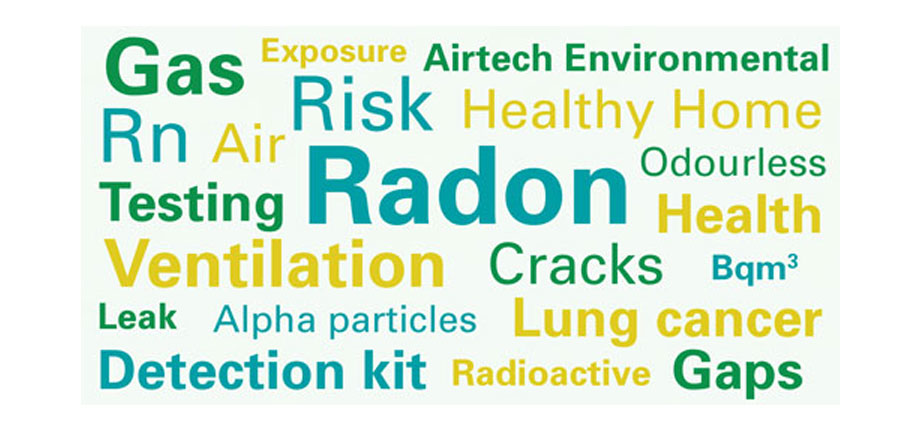Airtech, the ventilation specialists, is supporting UK Radon Awareness Week (4-10 November 2019.) Run by the UK Radon Association, this year the campaign is focusing on recent research from Public Health England (PHE) and University College London (UCL) that reveals that home energy efficiency measures, such as double glazing and insulation, are linked to increasing indoor radon levels. This in turn is raising the risk of lung cancer caused by exposure to the gas. Since landlords have a Duty of Care under the Homes Act to provide a safe home, radon is therefore a major consideration for social housing providers.

According to recent research from the PHE and UCL ‘Home energy efficiency and radon: An observational study’, which analysed data from nearly half a million homes, energy efficiency measures that increase the air tightness of properties are shown to have an adverse association with indoor radon levels. The findings suggest the average radon concentration in homes with retrofitted double glazing was 67% higher than those without, a significant figure. In addition, higher radon readings were also found in homes with loft insulation and wall insulation.
To meet zero carbon targets, it is vital to improve the energy performance of the UK's housing stock with social housing providers keen to upgrade homes to both improve efficiency and resident comfort. However, the research states that compromising indoor air quality must be avoided when undertaking these energy efficiency measures through careful assessment and implementation practices. The study highlighted important implications including that energy efficiency measures in radon‐affected areas should be coupled with radon risk assessment strategies and monitoring to check radon levels are not negatively impacted.
“Improving the energy efficiency of homes is vital to meet UK zero carbon targets. However, it is essential to consider how energy efficiency measures, such as retrofitting double glazing, affect ventilation and in turn radon levels. This is especially important for social housing providers to ensure compliance with their duty of care under the Homes Act. At Airtech we can help landlords by providing testing to ensure radon levels are not above 200Bq/m3 which is the radon level that the PHE advises to take action,” explains Jeremy Cleeter, sales director at Airtech. “Once tested if a home is above 200Bq/m3 then we will advise and undertake remediation measures as required. We have helped landlords across the country from the South West to Scotland.”
For social housing providers the risks of radon are an important issue. The Homes (Fitness for Human Habitation) Act 2018 makes landlords more accountable for conditions in their homes. Properties are assessed on a robust criterion, and they will be deemed unfit for habitation if there are serious defects in one or more of the core areas listed in the Act. Included within this list is ventilation and the Hazards under the Housing Health and Safety Rating System which specifically includes radon gas. It is therefore vital for landlords to ensure that properties do not breach the Homes Act. If a home does not meet the standard and the property owner does not carry out the necessary repairs or maintenance, residents have the right to take them to court where a judge can issue an injunction forcing the work to be carried out.
Other than smoking, radon is the highest risk factor when it comes to lung cancer with over 1100 deaths each year estimated to be caused by exposure to the gas. A naturally occurring colourless, odourless radioactive gas, radon disperses harmlessly into the air outdoors. However, once it finds its way indoors, through gaps and cracks in floors and walls, it may build up to potentially harmful levels. Every building has radon and in most areas the levels are low, however, some buildings in "radon Affected Areas" have higher levels. Buildings in these areas need to be tested for radon. High levels can be reduced with simple measures.
Airtech, offers social housing providers a complete solution to help protect residents from the risks caused by radon gas in the home. Airtech has 30 years of experience in radon prevention and can offer a full range of products and services, from radon testing to full remediation of housing stock.
At Airtech the company offers social housing providers peace of mind that it can effectively test housing stock for radon through an efficiently organised programme to ensure all required properties are tested within necessary time scales. To ensure accurate testing Airtech leave test pods in properties for a three-month period to help ensure correct radon readings are collected.
The action level set by the UK Government for homes is 200Bq/m3. If a home has a radon level above 200Bq/m3, it is recommended by PHE to take action to reduce the level. If remediation is needed Airtech will recommend an appropriate solution to fit the levels of radon present, this could be installing positive input ventilation (PIV), which forces contaminated air out of a home by introducing fresh air into the property. Alternatively, in properties with very high levels of radon they may need to have an active radon sump, fitted with a fan. Sumps work effectively under solid floors, and under suspended floors if the ground is covered with concrete or a membrane.
The amount of radon gas released varies greatly depending on where you live and is more likely to be found in areas where the geology features concentrations of granite and limestone. Airtech has been a key player in radon preventative measures for many years in Devon, Cornwall, the North Wales, the North East, the North West and Scotland, all in areas where Radon levels are naturally very high and has worked to help reduce the radon levels in properties around the UK. Social housing providers can be assured that Airtech can offer a complete solution to radon prevention.
For, more information call 01823 690 292 email info@airtechsolutions.co.uk or visit the Airtech website
- Log in to post comments














